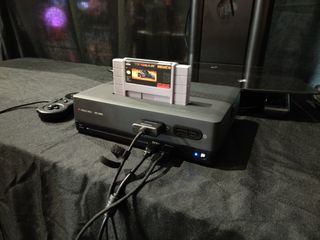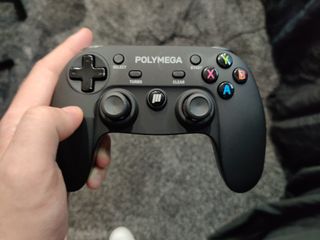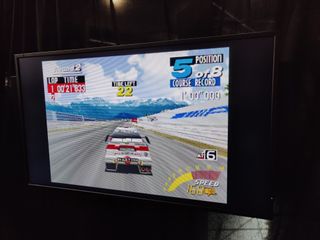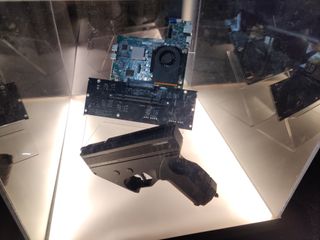E3 2019: Polymega Could Be the Only Retro Console You Need
The modular console lets you play your old games on modern hardware, including downloads, an online store, and support for dozens of historic consoles.
Retro gaming tends to work in one of two ways. Either you gather all the old consoles, controllers and games together and play them, which can be expensive and is often dangerous for the fragile hardware. Or, you use emulation, which is a godsend for people who weren’t playing the games at release, but often runs into authenticity issues, and can be tricky to set up.
But we’ve seen a device at E3 that tries to take an approach somewhere in the middle, while adding a modern shell that will make managing a collection far easier.

The Polymega, made by Playmaji, is intended for people who want to experience older games but who can’t be bothered with emulators, or long time fans who want to keep their aging hardware safe but still play their beloved favorites from their childhood.
MORE: Best of E3 2019: The Games and Gadgets to Watch
The UI is completely modern, with the games appearing as tiles you can easily navigate around and fire up. Each module comes with a Polymega controller based on the original model for the system in question, but you can also plug in your old controllers if you have them. There’s an in-game home menu too, which allows for things like mapping turbo buttons to save your fingers from constant jabbing, or save states if you want to cheat the game over screen. And whether you played these old games in NTSC or PAL format, the Polymega works whether you played the 50hz or 60hz versions.

While the idea of the Polymega is that it provides new hardware for your old games, you will be able to buy titles through an upcoming Polymega Shop storefront if you don’t already own them, and the base module comes with 12 pre-installed games, and each extra modules you buy come with five more. You can also install your own games, meaning you can plug in a disc or cartridge once only and then keep it safe while you play to your heart’s content.
During my time on the booth I got to try out Marvel Super Heroes vs. Street Fighter for Sega Saturn, Virtua Racing Deluxe for the Genesis’ 32X CD add-on, and Galactic Attack (RayForce) for the Saturn again. All of these can be played on the Polymega base unit, which supports other CD-using systems such as the TurboGrafx-CD, PlayStation 1, Sega CD or Neo Geo CD. Playing with both Polymega’s own controllers and some vintage ones both felt responsive, and the downloaded emulations worked just as smoothly.
Sign up to get the BEST of Tom’s Guide direct to your inbox.
Upgrade your life with a daily dose of the biggest tech news, lifestyle hacks and our curated analysis. Be the first to know about cutting-edge gadgets and the hottest deals.

There are also little additions to make the games more authentic to the original experiences. You can add two different kinds of scan line based on RGB and composite connectors with the virtual display function, or leave it as it is to see a normal HDMI output. You can make the system display vertically, as I saw when playing the shoot-em-up Galactic Attack, which is far better than playing with black bars on either side of the screen.
The base unit runs on a Coffee Lake S Intel processor, along with an integrated GPU and 32GB of solid-state memory for installing the games. You can see this on the backmost motherboard in the below image, which also features the modular board for the SNES.

The item at the bottom of that picture is a modern take on the light gun, known as the Retro Gun Controller 01 (RGC01). It’s designed to be compatible with HD televisions, using a white border on the screen to figure out where you’re aiming. So if you’re a fan of games like Sega’s Virtua Cop, you’ll be able to play it just like the good old days.
If everything you’ve read sounds enticing then you can currently pre-order the Polymega from its own website. It is due to launch this summer to those with pre-orders, and it will also be made available for retail purchase in the Fall. The system starts at $299 for the base edition, with various bundles available for those who want to add modules for particular consoles.
Be sure to follow our E3 2019 news hub all week long for the biggest reveals and impressions out of Los Angeles.
Image Credit: Tom’s Guide

Richard is based in London, covering news, reviews and how-tos for phones, tablets, gaming, and whatever else people need advice on. Following on from his MA in Magazine Journalism at the University of Sheffield, he's also written for WIRED U.K., The Register and Creative Bloq. When not at work, he's likely thinking about how to brew the perfect cup of specialty coffee.
